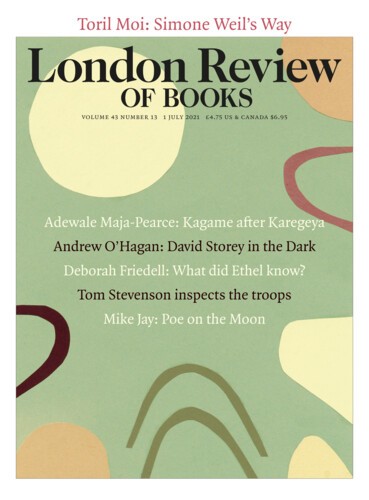Questions that ought to be asked of British foreign policy go unarticulated. Why did the ‘Indo-Pacific tilt’ (to use the Cabinet Office’s preferred term) become a British priority? Why is the Royal Navy sailing ships through the Taiwan Strait? Why is Britain conducting military training programmes in the Persian Gulf and ten countries from Gambia to Somalia? Why did the UK become so heavily involved in the atrocities committed in Yemen?
Tom Stevenson
Tom Stevenson is a contributing editor at the LRB. His collection of essays, Someone Else’s Empire: British Illusions and American Hegemony, many of which first appeared in the paper, was published in 2023.
On 16 September the World Bank discontinued its annual Doing Business report. It had been one of the Bank’s flagship publications: a detailed index of the conditions for businesses in different countries around the world, along with an eye-catching league table. Countries could improve their ranking by cutting red tape, strengthening investor rights or making labour more ‘flexible’ – the standard neoliberal reforms. Following the prescription rarely made places richer or more developed, but that didn’t seem to affect the report’s influence.
The first thing you notice is the smell. After a controlled fire – hearth, camp, pyre – the air smells dry, because firewood is dry. But wildfires burn living flora. Walking over land razed by wildfires you breathe resinous air, the fumes of combusted sap. During this summer’s record-breaking heatwave around the Mediterranean, wildfires broke out in Greece, Cyprus, Israel, Kabylia, Provence, Turkey, Sicily and across southern Italy. In August I went to Sardinia, where the fires had burned thousands of hectares of land and displaced hundreds of people. According to Sardinian apiculturists, millions of bees were killed.
The decision to expand the UK’s nuclear weapons stockpile by 40 per cent was slipped onto page 76 of the government’s Integrated Review of Security, Defence, Development and Foreign Policy in March. The only reason to announce a major strategic decision in such a quiet way is to avoid attention, which is exactly what happened. The UK is now committed to maintaining a larger stock of nuclear warheads than China (according to US estimates) and there has been too little scrutiny of the policy.
The Most Corrupt Idea of Modern Times: Inspecting the Troops
Tom Stevenson, 1 July 2021
It is one thing to station military forces around the world to maintain your empire, but quite another to do so for someone else’s. It’s not a new observation that those in power in Britain have become more culturally militarist as the UK has been shorn of actual global military influence. It’s harder to explain the persistence of imperial lackeydom after Iraq. Part of the reason is a refusal, in most parts of society, to confront the reality of the post-9/11 wars. An aphakic view of the British military’s role in the world persists. The UK remains a country in which the phrase ‘east of Suez’ is used without irony. A country that claims having soldiers in 46 countries is necessary to keep its citizens safe. A country where professing a willingness to use nuclear weapons is considered a precondition for political office. A country that passes legislation to protect itself from prosecution for torture and war crimes (the new Overseas Operations Bill was criticised by the UN special rapporteur on torture as ‘one of the most corrupt ideas the UK has come up with in modern times’).
Podcasts & Videos
Weapons of War
Tom Stevenson and Thomas Jones
Tom Stevenson talks to Thomas Jones about the situation in Ukraine, the effectiveness of some of the weapons in use, from anti-tank missiles to economic sanctions, and the risk of nuclear escalation.
Read anywhere with the London Review of Books app, available now from the App Store for Apple devices, Google Play for Android devices and Amazon for your Kindle Fire.
Sign up to our newsletter
For highlights from the latest issue, our archive and the blog, as well as news, events and exclusive promotions.


